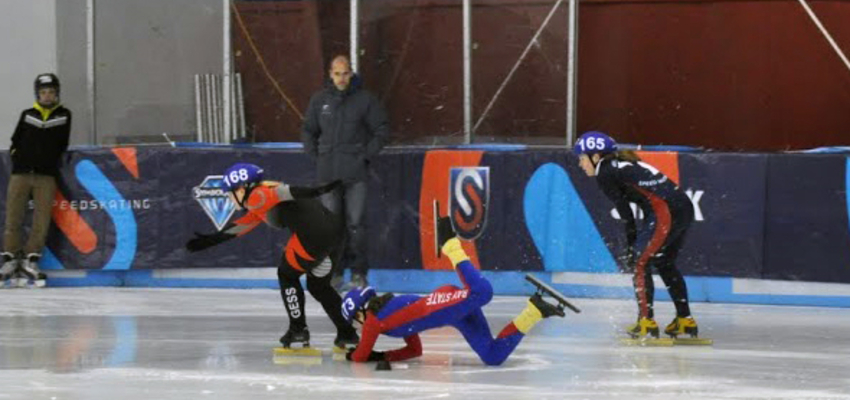
My Story—the Lowlight Reel
My
Story – the Lowlight Reel
From time to time when I’m training at the gym, someone will say to me “Oh that’s so easy for you.” I appreciate the compliment, but in my head I think “If only you could see all of the failures, and all the repetition behind this.”
I
grew up skating on outdoor ice. My parents hired a bulldozer when I was little,
and made a small rink in our backyard, complete with lights, boards, and a hut
with a wood stove. I spent many happy hours noodling around on that ice. My
parents also allowed their four children to skate ponds and swamps all over
town. This was the 1970s. No cell phones. No “Text me when you get to the other
side of the lake.” Nope. More like “Be back at the beach by 3 if you want a
ride home.” And so skating always gave me a sense of freedom, adventure, and
joy.
After
many years playing ice hockey, I took up short track speedskating at the age of
42. I was tired of getting hurt (broken wrist, concussion, back injury) and
wanted a new challenge, albeit one that still involved skating. I won the
National Masters Short Track Championship for my age group as a rookie in 2012.
In 2013 I returned to Nationals, and my nerves wrecked me. I fell, was disqualified
from one race, and generally hated every minute of the event.
Showing my Kung-Fu moves on ice at 2013 Nationals
A
few weeks later I sustained a solid concussion in another race when I fell
head-first into the pads. I spent a full year recovering, less from the
physical symptoms than the persistent fear of getting hurt again. I wasn’t sure
I would race anymore because I worried about falling in
every lap.
But
I stuck with it, and in the summer of 2014 I committed myself to winning a
second National Championship. I worked very, very hard, starting in May, for an
event that takes place in March. About six weeks before that competition, the
back/hip injury from my hockey years flared up. I could barely put my own socks
on, or sit for more than 15 minutes. I distinctly remember being in physical
therapy, and having this exchange with the therapist: “Why does my hip feel so
weak?” “Because it IS weak.” Not what I wanted to hear after a year of solid effort
and dedicated training.
I
limped into 2015 Nationals, and I pulled off the win. I am most proud of myself
for
going to the event because I was so
afraid of failing. I did not want to see someone else win that gold medal in
front of me, and I did not want to feel the resulting disappointment and
frustration. Yet I decided that staying home and being safe was a different
type of failure; I had to try. My younger self would’ve completely avoided the
discomfort, stress and potential loss. That’s one example of how training and
skating have made me a stronger person
inside.
Chasing down the teenagers in 2016
I
still wrestle with competition nerves, and I am still working on improving my
hip and core strength. It’s not easy. So why do I keep going? Often our society
pitches exercise as a way to Win, or look a certain way, or offset your “bad
habits.” For me it’s a path to regain that youthful sense of possibility, joy
and freedom. The satisfaction of moving well, learning new things, and becoming
stronger are what stick with me
every day
after that brief moment of standing on the podium passes by.
I wasn’t
born knowing how to jump high, skate fast or do chin-ups. I worked at it, and I
was fortunate to be paired with good coaches at the start of my functional
training career (such as Steve Zarriello, and Andrew DiOrio in Barrington).
What else creates success over the long haul? Commitment, effort, and an open
mind in regard to your potential, not inherent talent or ease.
So
next time you see me training, remember—I know what being in pain feels like,
and I’ve been frustrated with my progress and uncertain about reaching my
goals. Along the way I met people who helped and coached me to persevere and
improve; I did not achieve anything by myself. Now I want to “pay it forward”
and help you. I won’t promise you that the process will always be easy, or that
you will reach every single goal you set for yourself. I can tell you without a
doubt that the process of
trying, of
struggling and
choosing to continue,
will change you and make you realize you have the potential to be so much stronger,
inside and out.
Thanks
for listening, and see you soon!

